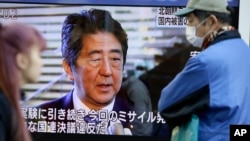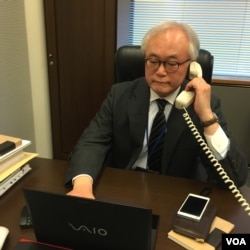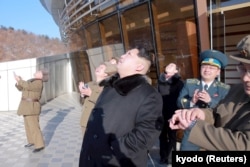North Korea’s latest long range missile launch has Japan moving quickly to impose additional unilateral sanctions against Pyongyang.
“I think it’s going to be a matter of hours, not days, before the Japanese government comes up with a list of sanctions to be imposed against North Korea,” said Tomohiko Taniguchi, an advisor to the cabinet of Japan’s prime minister on Monday.
Some key sanctions against North Korea which were previously eased by Japan are now expected to be tightened again.
"From the perspective of what would be the most effective method, the government is preparing to decide the specifics of a measure," the chief cabinet secretary, Yoshihide Suga, told reporters on Monday.
Eased sanctions to be tightened
Among the sanctions that have been eased: a ban on senior officials of North Korea’s de facto embassy from re-entering Japan after visiting North Korea.
The two countries have no diplomatic relations. The pro-Pyongyang General Association of Korean Residents in Japan, known as Chosen Soren, for decades has served as the tolerated conduit between Tokyo and Pyongyang.
Japan is now expected to reimpose a lower threshold of three million yen (about $25,500) for reporting of remittances to North Korea from Japan. It is currently relaxed at 30 million yen ($255,000).
Sources say the list of people connected to North Korea and banned from entering Japan is also likely to be expanded.
Stronger financial sanctions
Tokyo, in concert with Seoul and Washington, is also looking at tightening financial sanctions on North Korea.
A range of sanctions, taken individually and collectively by a number of nations and U.N. resolutions, appear to have done little to dissuade North Korea’s young leader, Kim Jong Un, from defying widespread international condemnation.
Japanese official scolds Kim Jong Un
“It may be that the international community should have paid more attention to what the naughty boy in North Korea wishes to do,” Taniguchi told VOA during an interview at the official residence of Prime Minister Shinzo Abe.
North Korea’s multi-stage rocket flew over Japan’s southern island of Okinawa on Sunday morning before placing an object into orbit around the Earth.
Japan’s self-defense forces deployed PAC-3 surface-to-air batteries after North Korea revealed plans for the launch, but the Patriot missile units did not attempt to engage on Sunday.
“PAC-3 is there to shoot down flying objects of any sort that could do any harm to Japan and the people. The final analysis proved that those dangers were not imminent,” Taniguchi told VOA.
United Nations meeting
Japan, along with the United States and South Korea, called for Sunday’s emergency session of the U.N. Security Council. The Japanese ambassador to the U.N., Motohide Yoshikawa, said the time for dialogue is over and called for more pressure in the form of a “robust” Security Council resolution to stop Pyongyang.
U.S. Ambassador Samantha Power, following the Sunday closed-door session, said the Security Council members were united in condemning the “illegal missile launch” in defiance of resolutions of the world body.
In a posting on Twitter, Power said: “Nobody fooled by ‘peaceful earth observation’ nonsense.”
North Korea has described its Sunday launch as a peaceful act to place an earth observation satellite into orbit.
Debate over North Korea's technological progress
A space engineering specialist has told Japan’s quasi-official NHK network that Sunday’s launch reveals the North Koreans may have developed a more powerful version of a long-range ballistic missile.
The first and second stages of the rocket fell minutes earlier than observed during North Korea’s December 2012 launch, an indication the missile used a more powerful engine which consumed fuel more quickly, said Daido University president Akira Sawaoka.
Sawaoka, a senior counselor for the Japan Aerospace Exploration Agency, called the technological progress the North has made in the last five to six years significant and not to be underestimated.
Others however, say it is premature to conclude Sunday’s launch marks a significant advancement.
Analyzing a preliminary overlay of the exterior imagery of the latest vehicle on the launchpad with that of the Unha-3 rocket from four years ago “we don’t know how much tinkering went on inside, but the similar splash down zones in 2012 and 2016 makes me think – not too much,” wrote Melissa Hanham in the armscontrolwonk.com blog. She is a senior East Asia research associate at the James Martin Center for Non-Proliferation Studies.
Some in the non-proliferation community say North Korea's intent is having a ballistic missile armed with a nuclear warhead capable of crossing oceans.
Sunday’s launch came one month after North Korea conducted its fourth nuclear test, which it hailed as an underground detonation of a hydrogen bomb.
The United States and others have cast doubt on the blast being caused by a hydrogen weapon.
North Korea, meanwhile, is already planning its fifth nuclear test, according to reports in Seoul attributed to South Korea’s National Intelligence Service. And a pro-North Korean newspaper in Tokyo is predicting further ballistic missile launches.
“In the future as well, the world will see Kwangmyongsong-class satellites continue to blast off and soar high into the sky at a time and at the place determined by the Workers’ Party of Korea,” according to the online edition of the Choson Sinbo.














